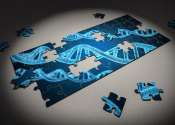DNA provides unique look at moa and climate change
Ancient moa DNA has provided insights into how species react to climate change, a University of Otago study has found.

Ancient moa DNA has provided insights into how species react to climate change, a University of Otago study has found.
Plants & Animals
May 10, 2022
0
173

A team led by current and former Carnegie plant biologists has undertaken the largest ever functional genomic study of a photosynthetic organism. Their work, published in Nature Genetics, could inform strategies for improving ...
Plants & Animals
May 9, 2022
0
39

The discovery of pottery from the ancient Lapita culture by researchers at The Australian National University (ANU) has shed new light on how Papua New Guinea (PNG) served as a launching pad for the colonization of the Pacific—one ...
Archaeology
Apr 22, 2022
0
441

As many humans prepare to unwrap their Easter eggs, scientists have solved one of nature's biggest criminal cases, an egg forgery scandal two million years in the making. Their findings suggest that the victims of this fraud ...
Plants & Animals
Apr 11, 2022
0
160

Oak Ridge National Laboratory scientists had a problem mapping the genomes of bacteria to better understand the origins of their physical traits and improve their function for bioenergy production. The method they had successfully ...
Cell & Microbiology
Apr 6, 2022
0
93

Sharks have been around for 450 million years, outliving the dinosaurs and soldiering on through several mass extinctions. Yet their numbers in the open oceans have plummeted by an alarming 70% over the past 50 years and ...
Ecology
Apr 5, 2022
0
7

One of the ultimate goals of medical science is to develop personalized disease diagnostics and therapeutics. With a patient's genetic information, doctors could tailor treatments to individuals, leading to safer and more ...
Cell & Microbiology
Mar 22, 2022
0
13

Utilizing an innovative experimental model incorporating 240,000 strains of brewer's yeast descended from two common "parents," USC and Stanford University researchers published a new study providing insight into the genetic ...
Molecular & Computational biology
Mar 18, 2022
0
43

Salk Institute researchers have developed a new genomic technology to simultaneously analyze the DNA, RNA and chromatin—a combination of DNA and protein—from a single cell. The method, which took five years to develop, ...
Cell & Microbiology
Mar 9, 2022
0
46

After injury, plants make a trade-off between repairing damaged tissue and ramping up their defenses, according to a new study led by researchers in New York University's Center for Genomics and Systems Biology and published ...
Plants & Animals
Feb 10, 2022
0
960